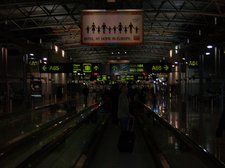 The European Union Transport Committee has drafted a regulation which will ensure airlines don’t lose unused slots at airports because of the recession. Air carriers will be entitled to the same series of slots in summer 2010 as were allocated to them during summer 2009 regardless of their use in between.
The European Union Transport Committee has drafted a regulation which will ensure airlines don’t lose unused slots at airports because of the recession. Air carriers will be entitled to the same series of slots in summer 2010 as were allocated to them during summer 2009 regardless of their use in between.
This certainly makes it extremely difficult for airports who struggle to find new operators or airlines prepared to expand flights during the economic downturn. Even if an airline expands its routes (as for instance has been seen with Emirates) they will not be guaranteed to be able to keep them come 2010.
The European Union Transport Committee feels this move is essential to protect the airlines who should not be forced to maintain flights at low load levels just to keep slots. What is not being considered is the impact this has on the airports who are also businesses and largely privately owned.
This move is also likely to impact on the emergent low cost carriers, many of whom have been trying to pick up competitive slots at airports to expand their operations.
According to the EUTC the big fear is that major competitors such as China, India & Japan whose airlines benefit from substantial state aid, would otherwise expand and lock out EU owned airlines from the prime airport slots, hampering their ability to recover post recession. This is understandable but the air travel industry is more than just airlines. Its also the airports and the travellers. Most airports structure aeronautical fees (the charges for take-offs & landings & passenger charges) is on a cost recovery basis. If slots are left vacant under these kinds of regulations then very simply the costs will need to be recovered from a smaller number of flights – resulting inevitably in higher charges for passengers.
There will be some form of protection from this due to contract negotiation terms with the airlines but inevitably it will come and we’re not going to be the beneficiaries of this move. Lets just hope that other countries don’t follow the EU’s lead.



